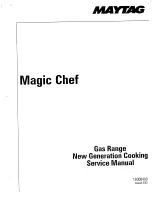
Part # 4523104 Rev 3 (03/04/10)
Page 13
MAINTENANCE AND CLEANING
Seasoning
Griddle
A . Remove all factory applied protective material by
washing with hot water, mild detergent or soap solution .
B . Apply a thin coat of cooking oil to the griddle surface,
about one ounce per square foot of griddle surface .
Spread over the entire griddle surface with a cloth to
create a thin film . Wipe off any excess oil with a cloth .
C . Light all burners, set at the lowest possible setting . Some
discoloration will occur when heat is applied to steel .
D . Heat the griddle slowly for 15 to 20 minutes . Then wipe
away oil . Repeat the procedure 2 to 3 times until the
griddle has a slick, mirror like finish . Do this until you have
reached the desired cooking temperature .
IMPORTANT: Do not set to a high position (on valve control)
or 450° (on thermostat control) during “break-in” period
NOTE: Steel griddle surface will tone (blue discoloration)
from heat . This toning will not diminish function or operation
and it is not a defect .
The griddle will not require reseasoning if it is used properly .
If the griddle is over heated and product begins to stick to
the surface it may be necessary to repeat the seasoning
process again . If the griddle is cleaned with soap and water it
will be necessary to reseason the griddle surface .
Cast Iron top Grates
First, remove the cast iron top grates from the range . Wash
the cast iron top grates thoroughly with a mild soap and
warm water . Dry the cast-iron top grates thoroughly with a
clean cloth . Immediately after drying, season the top grates
lightly with a non-toxic oil, (Liquid vegetable oil or Pam spray
oil) WARNING; DO NOT SEASON THE TOP GRATES WHILE ON
THE RANGE TOP! Seasoning grates on the range top over an
open flame could cause a flash fire . After seasoning, replace
the top grates onto the range . Turn all the range top sections
“ON LOW” . Allow the top sections to burn in this manner
for at least 20 minutes before using pots or pans on the top
grates . SEASONING OF THE TOP GRATES WILL BE REQUIRED
WHENEVER THEY HAVE BEEN CLEANED . FAILURE TO SEASON
GRATES WILL CAUSE RUSTING .
Stainless Steel
For routine cleaning, wash with a hot water and detergent
solution . Wash just a small area at a time or the water will
evaporate leaving the chemicals behind causing streaking .
Rinse the washed area with a clean sponge dipped in a
sanitizing solution and wipe dry with a soft clean cloth
before it can dry .
Use a paste (of water and a mild scouring powder) if you
have to, but never rub against the grain . All stainless steel has
been polished in one direction . Rub with the polish lines to
preserve the original finish . Then thoroughly rinse as before .
To prevent fingerprints there are several stainless steel
polishes on the market that leave an oily or waxy film . Do not
use on surfaces that will be in contact with food .
Stainless steel may discolor if overheated . These stains can
usually be removed by vigorous rubbing with a scouring
powder paste .
Use only stainless steel, wood or plastic tools if necessary
to scrape off heavy deposits of grease and oil . Do not use
ordinary steel scrapers or knives, as particles of the iron may
become imbedded and rust . NEVER USE STEEL WOOL .
Either a typical bleach solution or hot water can be used to
sanitize stainless steel .
Oven Interior (Porcelain Enamel)
NOTE: Disconnect line cord (if applicable from power supply
before cleaning or servicing .
1 . Before cleaning oven interior, remove all oven racks
and guides (if “RC” base) . Oven racks and guides can be
cleaned with a mild soap and warm water or run through
dish washer .
2 . The porcelain interior can be cleaned with oven cleaners
such as “Easy Off, or “Dow Oven Cleaner” .
Follow product manufacturer’s instructions for proper use .
Open Top Burners
Cleaning of the range top burner is a simple procedure, and,
if done at regular intervals will prolong the life of the range
and ensure good flame characteristics .
1 . The most common problem with open burner ranges is
spillage . Once the burner ports are partially plugged with
food, the air-to-gas mixture is disturbed and results in an
inefficient burner .
2 . Wipe any spills as they occur .
3 . Grids and trays should be removed daily, washed, rinsed
and dried thoroughly .
























